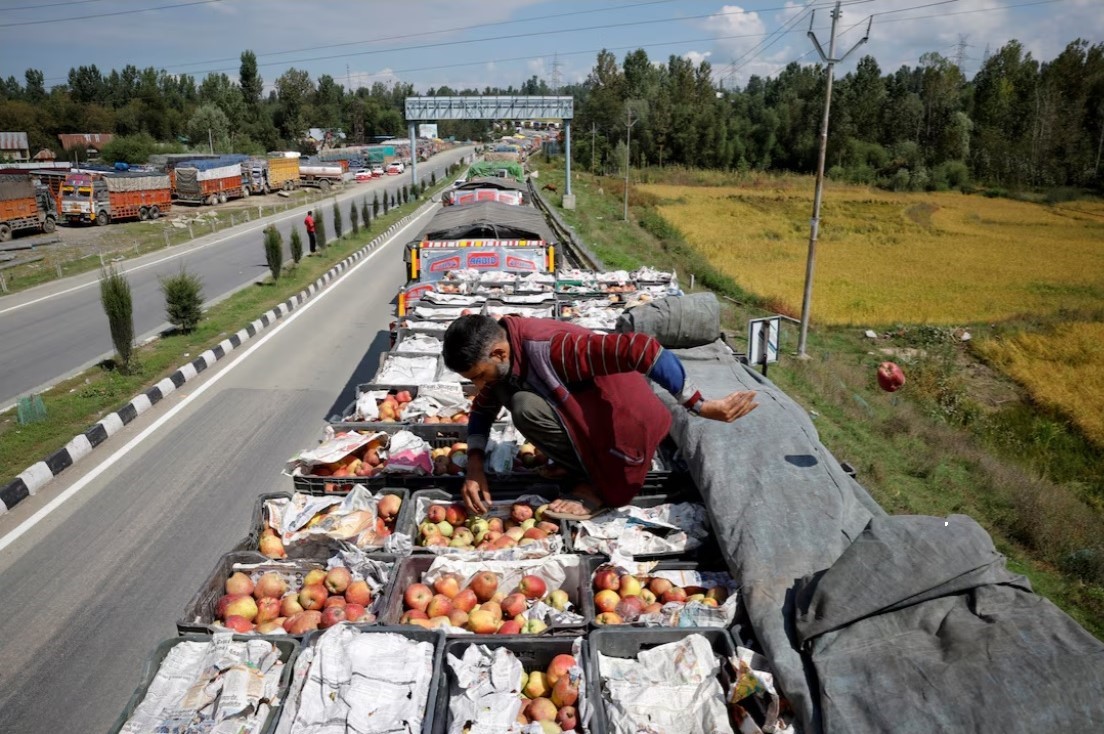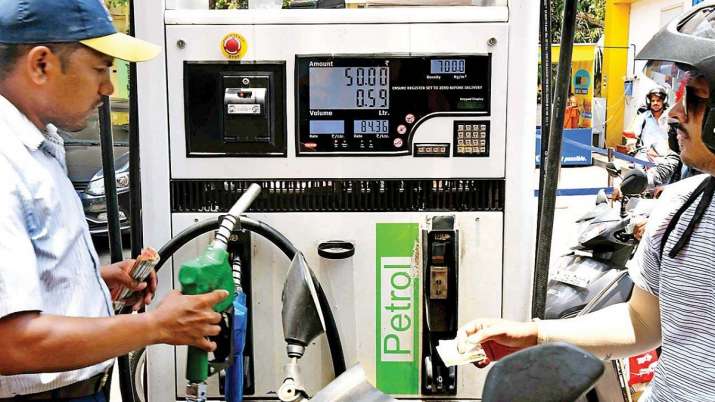Kashmir Apple Mandis Shutdown: Fruit Growers Protest Highway Crisis & Losses
By: Javid Amin| 14 September 2025
A Highway Crisis That Threatens Kashmir’s Apple Heartbeat
On September 14 and 15, 2025, Kashmir witnessed an unusual silence across its bustling apple mandis. Instead of the usual hum of auctioneers, transporters, and traders, shutters were down, trucks stood idle, and growers held peaceful protests.
The reason? The deteriorating condition of the Srinagar–Jammu National Highway (NH-44), a lifeline for the Valley’s economy, had left hundreds of fruit-laden trucks stranded for days. The crisis has sparked not just anger but a wave of anxiety among fruit growers who fear irreversible losses to Kashmir’s ₹12,000 crore apple industry, which sustains lakhs of families.
This shutdown, called by the Kashmir Valley Fruit Growers Cum Dealers Union, is more than a strike. It is a symbol of frustration, desperation, and demand for accountability from a government that growers say has been silent for too long.
Kashmir’s Apple Economy: The Fruit That Sustains Millions
Apple: The Pride of Kashmir
Kashmir’s apples are celebrated across India and abroad for their taste, texture, and aroma. For centuries, apple cultivation has been not just an occupation but a way of life.
Today, Kashmir produces more than 20 lakh metric tonnes of apples annually, accounting for nearly 70% of India’s apple production. Apples are exported to Delhi, Mumbai, Bangalore, Ahmedabad, Kolkata, and even international markets in the Middle East and Southeast Asia.
Employment & Livelihoods
The industry directly and indirectly supports over 3.5 million people — orchardists, transporters, traders, packers, cold storage workers, and commission agents.
-
Annual Value: ₹12,000 crore
-
Direct livelihood: 7 lakh families
-
Indirect beneficiaries: Transporters, packaging industry, cold storage operators
-
Key mandis: Sopore, Shopian, Pulwama, Anantnag, Baramulla
It is no exaggeration to say that when Kashmir’s apples suffer, Kashmir’s economy suffers.
The Srinagar–Jammu National Highway (NH-44): A Fragile Lifeline
Why This Road Matters
The Srinagar–Jammu highway is Kashmir’s only all-weather road link to the rest of India. Every essential commodity — food, medicines, fuel, building material, and agricultural produce — travels through this artery.
But for decades, NH-44 has been plagued by:
-
Frequent landslides at vulnerable points in Ramban and Udhampur
-
Narrow patches unfit for heavy truck traffic
-
Ongoing construction projects causing bottlenecks
-
Weather-related closures in winter and monsoon
The Udhampur Bottleneck
The Tharad–Balli Nallah stretch in Udhampur district has become the worst choke point. Trucks carrying perishable produce wait for days, rotting under tarpaulins.
“Every day of delay means crores of rupees lost,” said Fayaz Ahmad Malik, President of Sopore Fruit Mandi. “This is not just about money; it is about survival for lakhs of families.”
The Two-Day Shutdown: A Protest That Spoke Volumes
What Happened on September 14–15?
-
All apple mandis closed across Kashmir
-
Peaceful protests were held from 8 AM to 9 AM each day
-
Growers carried placards demanding unhindered truck movement
-
Slogans of “Save Our Apples, Save Our Livelihoods” echoed in Sopore, Shopian, and Anantnag
Voices from the Ground
“Why hasn’t the Chief Minister or Horticulture Minister convened even a single meeting?” — Protester at Sopore Mandi
“We can’t feed our families if our apples rot on the road.” — Orchardist from Shopian
The shutdown was not just about the present crisis. It was about decades of neglect, broken promises, and mounting frustration.
Counting the Losses: Crores Rotting on the Highway
Sopore’s ₹1,200 Crore Hit
Sopore Fruit Mandi, Asia’s second-largest fruit market, reported losses exceeding ₹1,200 crore. With hundreds of trucks stranded, apples that should have reached Delhi or Mumbai on time arrived late, losing freshness and market value.
Ripple Effect of Delays
-
Farmers in Debt: Many growers rely on bank loans. With prices crashing, repayment becomes impossible.
-
Cold Storage Overload: Limited capacity means not all apples can be saved.
-
Price Crash in Mandis: Traders lower rates for delayed consignments.
-
Consumer Impact: Ironically, retail apple prices outside Kashmir rise due to disrupted supply.
Government Response: Parcel Train and Promises
The Parcel Train Service
In recent months, the government launched a parcel train from Budgam to Delhi to transport apples. While helpful, growers argue it is not enough.
“Unless the service is extended to Sopore, it won’t serve its purpose,” said a grower from Baramulla.
What Growers Want
-
Immediate Road Repairs on NH-44 choke points
-
Unhindered Truck Movement for perishables
-
Extension of Rail Cargo Service to Sopore
-
Compensation for Losses already incurred
So far, these demands remain largely unmet.
Historical Context: Kashmir’s Apple Trade Through the Years
The Rise of the Apple Industry
-
1970s: Government schemes boosted apple cultivation as a cash crop.
-
1980s–1990s: Sopore and Shopian emerged as trading hubs.
-
2000s: Export to international markets increased.
-
2010s: Cold storage and packaging industries developed.
Yet, the highway remained a perennial bottleneck.
Past Highway Crises
-
2012: Highway closure led to 40% losses in apple exports.
-
2018: Floods blocked the road for weeks.
-
2020 (COVID-19): Lockdowns disrupted transport, exposing the vulnerability of growers.
The present protest is not new — it is the latest chapter in a long saga of infrastructural neglect.
Comparative Lens: Himachal vs Kashmir
Himachal Pradesh is India’s other major apple producer. But unlike Kashmir, it has:
-
Multiple road routes connecting to Delhi and Chandigarh
-
Better cold storage facilities
-
Government-backed marketing boards ensuring minimum price protection
Kashmir’s growers often feel like second-class citizens in comparison.
Climate Change: A Silent Threat to Kashmir’s Apples
Even if the highway issue is resolved, growers face another looming crisis — climate change.
-
Erratic Snowfall: Reducing chilling hours needed for apple quality
-
Untimely Rains & Hailstorms: Damaging blossoms and fruits
-
New Pests & Diseases: Emerging due to changing weather
Without adaptive measures, Kashmir’s apple yield could decline by 25–30% in the coming decades.
Voices from the Ground: Human Stories
Abdul Rashid, Orchardist from Shopian
“I took a bank loan of ₹8 lakh for my orchard. If my apples don’t reach the market on time, I can’t repay. What do I tell the bank?”
Shabnum, Woman Grower from Pulwama
“We women work side by side with men in orchards. But when losses happen, it is the women who skip meals to save money for children.”
A Truck Driver’s Perspective
“We spend nights on the highway, with no toilets, no food, no safety. By the time we reach Delhi, half the fruit is spoiled.”
Expert Opinions
-
Economists: “If the apple economy collapses, Kashmir’s rural economy collapses with it.”
-
Agricultural Scientists: “Diversification and modern storage are essential to withstand shocks.”
-
Policy Analysts: “The issue is political will. Infrastructure should have been upgraded decades ago.”
Global Lens: Learning from International Models
-
USA (Washington State): Robust cold chain and efficient highways ensure apples reach markets fresh.
-
China: Large-scale farmer cooperatives reduce middlemen and increase bargaining power.
-
New Zealand: Branding and global marketing campaigns have made “NZ Apples” a premium brand.
Kashmir can adopt these lessons to strengthen its apple trade.
The Way Forward: A Roadmap for Saving Kashmir’s Apple Economy
-
Fast-Track Repairs – Fix NH-44 with international expertise.
-
Expand Rail Cargo Network – Make Sopore and Shopian hubs.
-
Cold Storage Revolution – Modern units across districts.
-
Digital Marketplaces – Online auctions and e-commerce exports.
-
Grower Cooperatives – Stronger bargaining power and reduced exploitation.
-
Policy Dialogue – Regular meetings between government and growers.
Bottom-Line: Will the Apple Voice Be Heard?
The two-day shutdown of Kashmir’s apple mandis may have ended, but its echo lingers. It was more than a strike — it was a cry for dignity, livelihood security, and accountability.
As the smell of rotting apples fills stranded trucks, one question hangs in the air:
Will the government act before the apple industry — Kashmir’s pride and backbone — crumbles under neglect?



